A Story from Chikamatsu Blu-ray Movie
HomeA Story from Chikamatsu Blu-ray Movie 
近松物語 / Chikamatsu monogatari / The Crucified LoversCriterion | 1954 | 102 min | Not rated | Nov 13, 2018
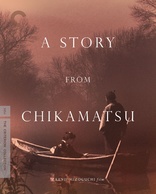
Movie rating
7.8 | / 10 |
Blu-ray rating
| Users | 0.0 | |
| Reviewer | 4.0 | |
| Overall | 4.0 |
Overview
A Story from Chikamatsu (1954)
Ishun is a wealthy, but unsympathetic, master printer who has wrongly accused his wife and best employee of being lovers. To escape punishment, the accused run away together, but Ishun is certain to be ruined if word gets out.
Starring: Kazuo Hasegawa, KyŰko Kagawa, EitarŰ ShindŰ, EitarŰ Ozawa, YŰko MinamidaDirector: Kenji Mizoguchi
| Foreign | Uncertain |
| Drama | Uncertain |
| Romance | Uncertain |
| Period | Uncertain |
Specifications
Video
Video codec: MPEG-4 AVC
Video resolution: 1080p
Aspect ratio: 1.37:1
Original aspect ratio: 1.37:1
Audio
Japanese: LPCM Mono (48kHz, 24-bit)
Subtitles
English
Discs
Blu-ray Disc
Single disc (1 BD)
Playback
Region A (locked)
Review
Rating summary
| Movie | 4.5 | |
| Video | 5.0 | |
| Audio | 5.0 | |
| Extras | 2.0 | |
| Overall | 4.0 |
A Story from Chikamatsu Blu-ray Movie Review
Reviewed by Dr. Svet Atanasov January 20, 2019Kenji Mizoguchi's " A Story from Chikamatsu" (1954) arrives on Blu-ray courtesy of Criterion. The supplemental features on the disc include an exclusive new video interview with actress Kyoko Kagawa, and an exclusive new video essay created by film scholar Dudley Andrew. The release also arrives with an illustrated booklet featuring an essay by Haden Guest, as well as technical credits. In Japanese, with optional English subtitles for the main feature. Region-A "locked".
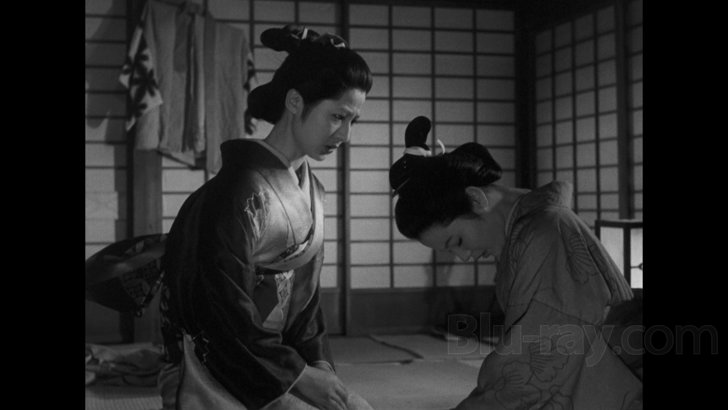
How can it be?
The play is as old as the wheel. If his true identity is about to be exposed, the hypocrite accuses someone else of everything that he is guilty of. Then, usually while publicly claiming moral superiority, the hypocrite proceeds to destroy his innocent target. He absolutely has to do it in order to re-legitimize and further strengthen his false identity. But, sometimes the play backfires.
Inspired by a classic drama written by Monzaemon Chikamatsu, Kenji Mizoguchiís film follows closely a couple of different characters living in the ancient city of Kyoto. The first is the prominent scroll-maker Ishun (Eitaro Shindo) who has been granted exclusive privileges by the Shogunate that have not only made him immune to the ongoing recession, but actually dramatically increased his wealth. This is the very reason, however, why he has also become one of the most envied people in the city. But, instead of being even more careful about his public image, Ishun has been spending long hours in the cityís drinking houses, while at home he has secretly started visiting the bedroom of his much younger servant Otama (Yoko Minamida). Fearing an early termination of her contract with Ishun, the girl has been unable to reject his sexual advances and has simply chosen to remain silent until her boss eventually finds a new mistress. But the old manís persistence has only grown stronger, and during recent visits he has even offered her a new life by moving her in a home of her own.
Ishunís attentive wife, Osan (Kyoko Kagawa), is the second character. Completely clueless about her husbandís secret sexual adventures, she has been trying to figure out how to request yet another loan from him to help her struggling parents who have fallen behind on their mortgage save their home. But she has failed, and because even without asking him Ishun has repeatedly declared that he has already given enough, she has increasingly started blaming herself for the misery that her parents will have to endure for the rest of their lives.
The final character is Mohei (Kazuo Hasegawa), Ishunís trusted senior assistant, who does all of the difficult manual work and then delivers the final scrolls to his master for approval before they are shipped to their high-ranking clients at the Shogunate. Mohei also manages Ishunís finances, which means that he is the only one that has the authority to use his personal seal to request and make payments.
When the desperate Otama reveals to Mohei that their master has been cheating on his wife, a series of tragic events begin to unfold. At first Mohei attempts to protect the honor of his master and his wife, but when his efforts are misinterpreted, he and Osan become fugitives. In the ensuing chaos the two discover that not only they have a lot in common, but were also meant for each other.
At the core of Mizoguchiís film is a beautiful but very tragic romantic story which with a few minor exceptions evolves in the same way that the famous story about Romeo and Juliet does. The specific period setting that gives the story its structure and especially the various socio-cultural overtones that shape up the conflicts in it, however, produce a unique description of the social hierarchy in feudal Japan, which is what actually makes the film very interesting.
The key point that is made is that the old social system was built to protect two groups of people: those at the very top, and those that were willing and capable of serving it and protecting its self-preservation. The rules were flexible for the people from the second group, so long as they were smart enough to maintain a Ďproperí public image. (The public execution of the Ďadulterersí that is seen very early into the film is used precisely to make this very important detail clear). The few people from the first group of course did not have to worry about the rules.
So, it is very telling that Ishunís troubles and eventually his downfall are determined by his inability to remain a good chameleon. His morality, for instance, is never at the center of the drama, and this is very important to underscore. It is the fact that he has been exposed that is on everyoneís mind, and it is exactly what ultimately becomes the hottest news in town.
It is also very much worth pointing out that the smearing of the fugitives is hardly as disturbing as the logic that their parents use to rationalize their actions after they meet them and ask for help. Right and wrong are completely irrelevant at this point, and the only thing that matters is obeying those that have the authority to reshape lives.
A Story from Chikamatsu Blu-ray Movie, Video Quality 
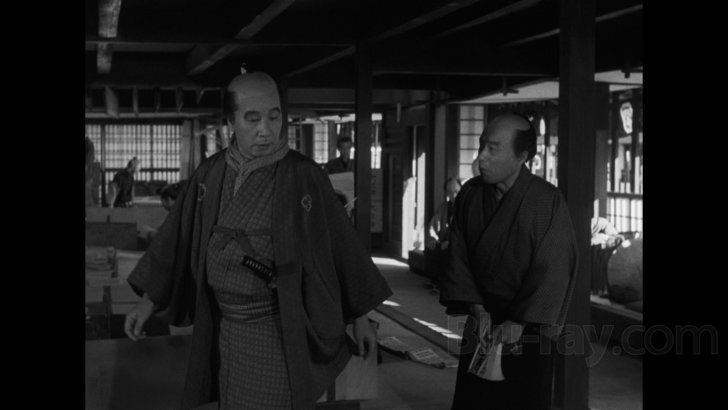
Presented in its original aspect ratio of 1.37:1, encoded with MPEG-4 AVC and granted a 1080p transfer, Kenji Mizoguchi's A Story from Chikamatsu arrives on Blu-ray courtesy of Criterion.
The following text appears inside the leaflet that is provided with this Blu-ray release:
"Supervised by cinematographer Masahiro Miyajima and filmmaker Martin Scorsese, this new 4K digital restoration was undertaken by Kadokawa Corporation and The Film Foundation, in cooperation with the Japan Foundation, from a 35mm fine-grain scanned at Cineric in New York on the facility's proprietary 4K high-dynamic-range wet-gate film scanner. The original monaural soundtrack was remastered from a 35mm variable-density optical soundtrack and restored by Audio Mechanics in Burbank, California.
Colorist: Daniel DeVincent/Cineric.
Head of visual restoration: Seth Berkowitz/Cineric."
I have to say that this is the best all-around restoration of a Kenji Mizoguchi film that I have seen to date. What impressed me the most is not the outstanding delineation, clarity, and balance of the daylight footage, but the excellent and incredibly nuanced dark/nighttime footage. There are ranges of native nuances that are typically quite difficult to reveal on restorations of other Japanese films from the same period, but here they are wonderfully defined and exposed. If you view your films on a very large screen, or project them, you will be impressed too. I guaranteed it, because there really aren't that many elaborate restorations of period Japanese films that reveal this particular type of consistent quality. As expected, grain is very fine and nicely resolved, and there are no traces of sharpening adjustments or other digitally-introduced anomalies. Image stability is excellent. Also, the entire film has been carefully cleaned up and looks spotless. Fantastic restoration. (Note: This is a Region-A "locked" Blu-ray release. Therefore, you must have a native Region-A or Region-Free player in order to access its content).
A Story from Chikamatsu Blu-ray Movie, Audio Quality 
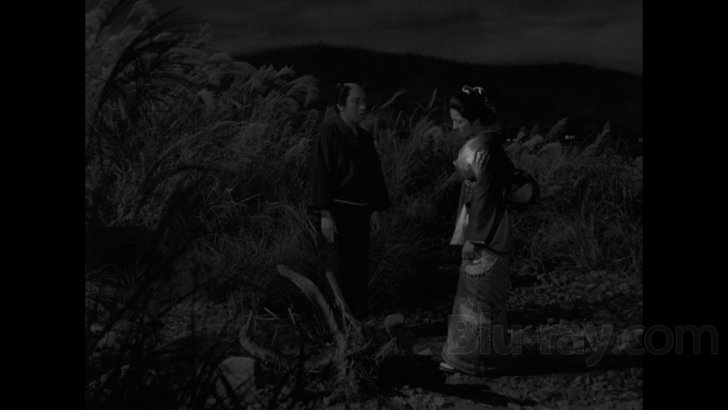
There is only one standard audio track on this Blu-ray release: Japanese LPCM 1.0. Optional English subtitles are provided for the main feature.
The lossless track is stable, clean, and with some surprisingly good dynamic qualities. For example, when traditional Japanese instruments are used to enhance the dramatic atmosphere, dynamic intensity is excellent. Elsewhere the background noise and the dialog are also very nicely balanced, and as a result clarity never suffers. Also, if there ever were any conventional age-related imperfections, such as hum, hiss, and uneven high-frequencies, it is impossible to tell now.
A Story from Chikamatsu Blu-ray Movie, Special Features and Extras 
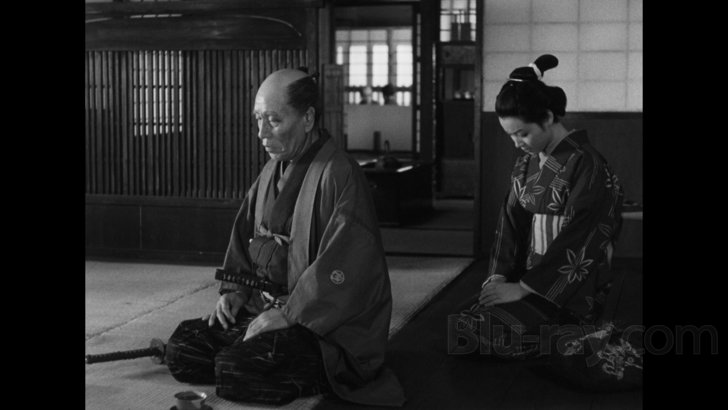
- Kyoko Kagawa - in this new video interview, actress Kyoko Kagawa, who plays the chartacter of Osan. recalls her work with director Kenji Mizoguchi and fellow cast members during the filming of A Story From Chikamatsu. The interview was conducted in Tokyo in 2018 for Criterion. In English, with optional English subtitles. (11 min, 1080p).
- Mizoguchi: The Auteur Behind the "Metteur en scene" - in this new video essay, film scholar Dudley Andrew deconstructs A Story from Chikamatsu and explains how Kenji Mizoguchi incorporated elements of Bunraku theater in it. The essay was created in 2018 for Criterion. In English, not subtitled. (42 min, 1080p).
- Leaflet - an illustrated leaflet featuring an essay by Haden Guest, director of the Harvard Film Archive, and technical credits.
A Story from Chikamatsu Blu-ray Movie, Overall Score and Recommendation 
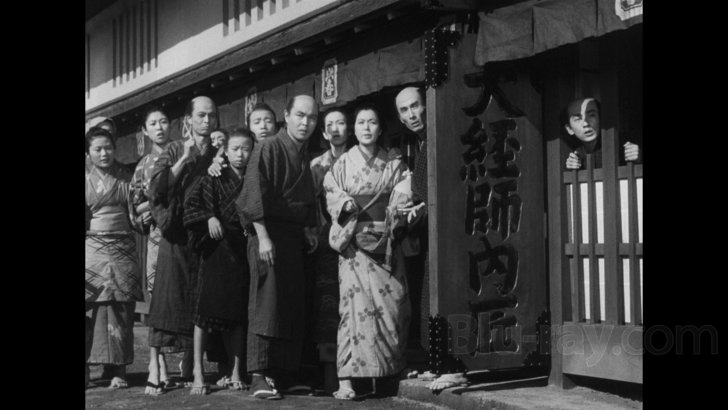
The hypocrisy and cynicism that are targeted in Kenji Mizoguchi's classic film have actually been entirely legitimized since the 1950s. What is different now is that there are wider ranges of mechanisms to either completely hide or 'logically' excuse them. Basically, it is a lot easier to create victims like Mohei and Osan, and then destroy them so that the 'proper' status quo is preserved. I liked the film a lot, it is beautiful, but it also made my blood boil because I could see so many parallels to various events from our daily news cycles. Criterion's Blu-ray release is sourced from an excellent 4K restoration, which is the best that I have seen done for a Mizoguchi film to date. Do not miss this release. VERY HIGHLY RECOMMENDED.
Similar titles
Similar titles you might also like

Elvira Madigan
1967

The Life of Oharu
西鶴一代女 / Saikaku ichidai onna
1952

Omar
2013

Oasis
오아시스 | 4K Restoration
2002

Michael
MikaŽl
1924

The Lovers on the Bridge
Les amants du Pont-Neuf
1991

Madame Bovary
1991

Le Combat dans l'Óle
Fire and Ice | Limited Edition
1962

Millennium Mambo
千禧曼波 / Qian xi man bo
2001

Summer with Monika
Sommaren med Monika | Original Uncut version
1953

Whirlpool of Fate
The Girl of the Water / La Fille de l'eau
1925

Chungking Express 4K
重慶森林 / Chung Hing sam lam
1994

Betty Blue
37į2 le matin | Director's Cut
1986

Rouge
胭脂扣 / Yin ji kau
1987

Two English Girls
Anne and Muriel / Les deux Anglaises et le continent
1971

Blanche
1971

Indochine
1992

Beanpole
Дылда / Dylda
2019

Hara-Kiri: Death of a Samurai
一命 / Ichimei
2011

The Wild Goose Lake
南方车站的聚会 / NŠn fāng chē zhŗn de jý huž
2019